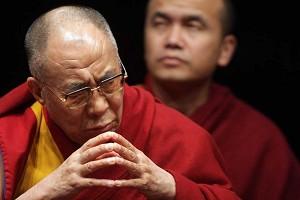BEIJING—Chinese authorities have been forcing Tibetans to sign a petition opposing the Dalai Lama’s return, a London-based group said, in apparent retaliation for the award of a high U.S. honour to Tibet’s spiritual leader.
President George W. Bush gave the exiled god-king the Congressional Gold Medal in Washington in October, infuriating Beijing. It came on the heels of the Dalai Lama’s reception by German Chancellor Angela Merkel in September.
The Dalai Lama, 72, has lived in exile in India since fleeing his predominantly Buddhist homeland in 1959 after a failed uprising against Communist rule. Closed-door talks between Beijing and his envoys have made little progress.
“The Chinese authorities are really stepping up their anti-Dalai Lama rhetoric and propaganda,” Anne Holmes, acting director of the Free Tibet Campaign, said in an e-mail on Sunday.
During a public meeting in December in Lithang in the Kham area of Gansu province, which is populated largely by Tibetans, residents were asked to raise their hands if they opposed the Dalai Lama’s return. No one obliged, the campaign group said.
Residents were then asked to raise their hands if they did not have weapons at home. As it is illegal to possess firearms, everyone raised their hand. A photo was then taken and sent to state media, claiming residents were opposed to the Dalai Lama’s return, the Free Tibet Campaign said.
Also in December, secretaries and accountants in townships in Gansu were invited on a nationwide tour paid for by the government, the group said.
Forced to Sign
Before setting out, they were called to a meeting in Lanzhou, capital of the northwestern province, and forced to sign a petition on behalf of the people they represent opposing the Dalai Lama’s return, the Free Tibet Campaign said. The meeting was apparently broadcast on local television.
An old man from Amchok town, Hezui city, refused to sign and was taken away and beaten, Holmes said. She said the beating had led a group of young Tibetans to attack township secretaries and accountants while they were eating at a restaurant in Gyelmogon.
Several secretaries were seriously injured and taken to hospital in Ganan city, Holmes said, quoting a monk who had witnessed the attack and spoken to the injured.
Matt Whitticase, spokesman for the group, said Tibetans in Gansu had been forced to celebrate the New Year by slaughtering pigs, contravening their earlier decision not to butcher hogs so as to pray for long life for the Dalai Lama who was born in the Year of the Pig.
Many in Tibet still pledge loyalty to the Dalai Lama despite Beijing’s condemnation of him as a separatist. While he advocates a “middle way” approach that advocates autonomy for Tibet within China, Beijing officials do not trust him.
Several Tibetans were arrested last year for burning furs after the Nobel Peace Prize laureate called on Tibetans not to wear the furs and skins of endangered animals.
Qin Yizhi, Communist Party boss in the Tibetan capital, Lhasa, has urged residents to “make new, greater contributions in opposing splittism, maintaining stability and promoting lasting peace”, the regional government’s official Web site said.
China regularly defends its rule in the Himalayan region, saying the Communists ended centuries of serfdom and brought prosperity to the underdeveloped region.
In December China dismissed accusations that religious repression was increasing in Tibet, and accused the Dalai Lama of wanting to reintroduce serfdom.





